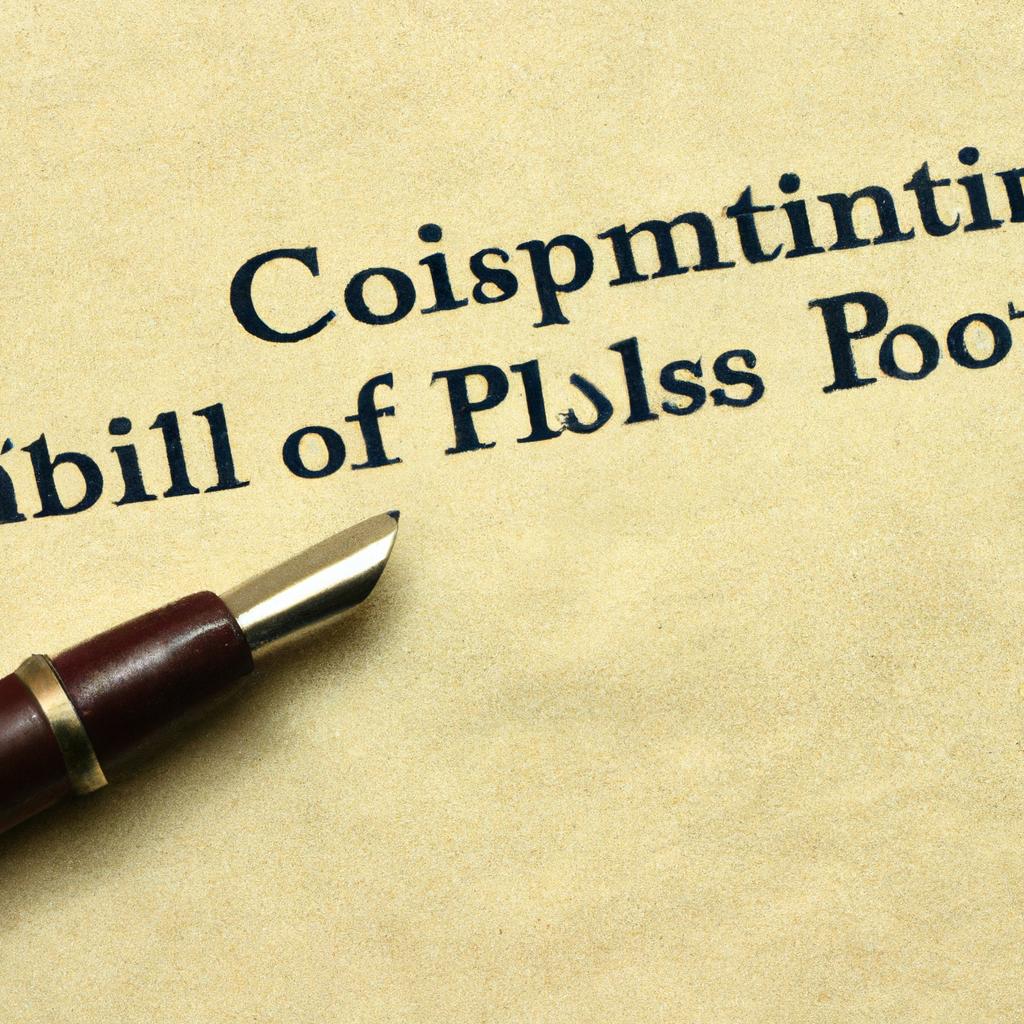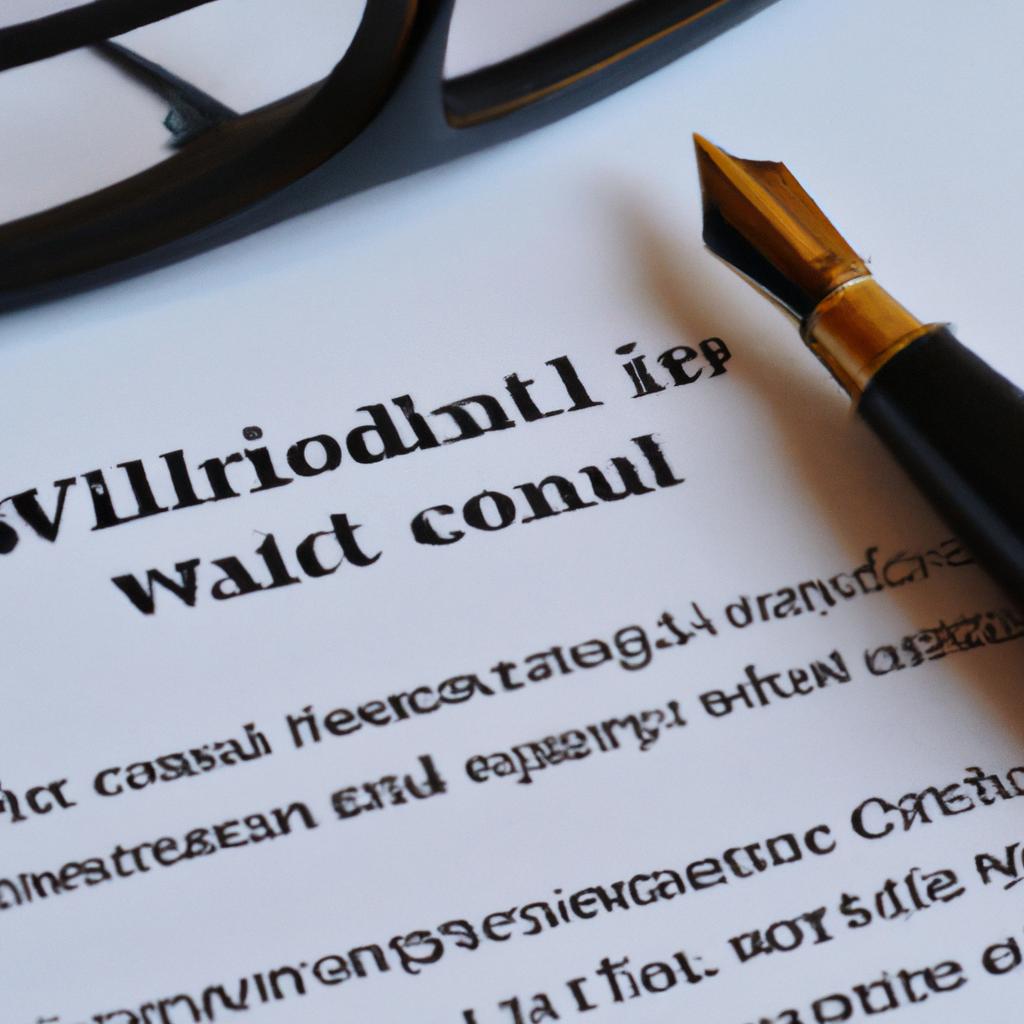In the intricate realm of estate planning and testamentary instruments, the concept of a codicil holds significant weight. A codicil, a term derived from the Latin word “codicillus” meaning a small book or writing, serves as a vital component in the realm of legal documentation. As seasoned practitioners in the field of law, the Morgan Legal Group, based in the heart of New York City, navigates the complexities of codicils with finesse and precision. Join us as we delve into the nuances of codicil meaning in law, shedding light on its intricate implications in the realm of estate planning and testamentary law.
Understanding the Purpose of a Codicil in Estate Planning
In estate planning, a codicil is a legal document that allows an individual to make changes or additions to their existing will without having to create an entirely new will. This can be useful in situations where only minor adjustments need to be made, such as updating beneficiaries or changing executor appointments. A codicil must comply with the same legal requirements as a will, such as being in writing, signed by the testator, and witnessed by at least two individuals.
It is important to understand the purpose of a codicil in estate planning to ensure that any changes made are legally valid and enforceable. By working with an experienced estate planning attorney, individuals can navigate the complexities of creating a codicil effectively. At Morgan Legal Group, our team of skilled attorneys is dedicated to helping clients with all aspects of estate planning, including the creation of codicils to ensure their wishes are carried out accurately.

Key Components to Include in a Codicil
When creating a codicil, it is crucial to include key components to ensure that your wishes are properly documented and executed according to the law. A codicil is a legal document that allows you to make amendments to your existing Will without having to create an entirely new document. It is important to include the following components in a codicil:
- Identification: Clearly identify yourself as the testator (creator of the Will) and provide your full name, address, and any other identifying information.
- Reference to Original Will: Include a reference to the original Will that you are amending, including the date the Will was executed.
- Amendments: Clearly state the changes you want to make to the original Will, whether it be adding, deleting, or modifying certain provisions.
- Signature: Sign and date the codicil in the presence of witnesses to ensure its validity.
| Important Components | Reason |
|---|---|
| Identification | Ensure the testator is clearly identified |
| Reference to Original Will | Establish connection to the existing Will |
| Amendments | Clearly state the desired changes |
| Signature | Ensure legal validity of the codicil |
By including these key components in your codicil, you can ensure that your wishes are accurately reflected and legally enforceable. Consulting with an experienced estate planning attorney can also provide valuable guidance and assistance in creating a codicil that meets all legal requirements and effectively communicates your intentions.

Ensuring Validity and Compliance of a Codicil in Legal Proceedings
When it comes to ensuring the validity and compliance of a codicil in legal proceedings, it is essential to understand the meaning and implications of this important legal document. A codicil is a supplementary document that is used to make amendments or additions to an existing will. It allows individuals to update their will without having to create an entirely new document. However, it is crucial to ensure that a codicil meets all the legal requirements to be considered valid and enforceable.
One key aspect of ensuring the validity and compliance of a codicil is to make sure that it is executed in accordance with state laws and regulations. This includes requirements such as the document being signed by the testator and witnessed by at least two competent individuals. Additionally, it is important to clearly identify the codicil as an amendment to the original will and specify the changes being made. By taking these steps and seeking guidance from a qualified legal professional, individuals can ensure that their codicil is legally sound and will be upheld in court.

Important Considerations When Amending a Will with a Codicil
When amending a Will with a Codicil, there are several important considerations to keep in mind to ensure that the process is carried out properly and effectively. One key consideration is to clearly outline the changes you wish to make to your Will in the Codicil. This includes specifying the exact clauses or provisions that you want to modify, add, or revoke.
Additionally, it is crucial to ensure that the Codicil complies with all applicable laws and regulations governing Wills and estate planning. This includes ensuring that the Codicil is properly executed and witnessed in accordance with legal requirements. Seeking guidance from a knowledgeable and experienced estate planning attorney can help ensure that your Codicil is legally valid and effectively amends your Will.
Q&A
Q: What is a codicil in law?
A: A codicil is a legal document that is used to make amendments or additions to an existing will.
Q: Is a codicil the same as a will?
A: No, a codicil is not the same as a will. A codicil is a supplement to a will, used to modify or update certain provisions.
Q: When would someone need to use a codicil?
A: A codicil may be necessary if the individual wants to make changes to their existing will, such as adding or removing beneficiaries, changing the executor, or updating specific bequests.
Q: Can anyone create a codicil?
A: Yes, anyone who is of sound mind and legal age can create a codicil to make changes to their will.
Q: Do codicils have to be witnessed?
A: Yes, codicils, like wills, must typically be signed and witnessed by at least two individuals to be considered legally valid.
Q: Is it better to create a new will instead of a codicil?
A: In some cases, it may be more appropriate to create a new will instead of a codicil, especially if the changes are extensive or if the original will is outdated.
Q: What happens if there are conflicting provisions between a will and a codicil?
A: If there are conflicting provisions between a will and a codicil, the court may need to interpret the intentions of the individual and determine which document takes precedence.
Q: Can a codicil be revoked?
A: Yes, a codicil can be revoked at any time by the individual who created it, as long as they are of sound mind.
Wrapping Up
In conclusion, understanding the concept of codicil in law can provide clarity and insight into the intricate world of legal documentation. Whether you are looking to make amendments to your will or simply delving into the nuances of legal terminology, the codicil serves as a valuable tool in ensuring that your wishes are carried out as intended. So next time you come across the term ”codicil,” remember its significance in shaping the legal landscape and the importance it holds in safeguarding your legacy.
 Codicil Meaning in Law: Understanding the Basics
Codicil Meaning in Law: Understanding the Basics
In the world of law, there are many legal terms and jargon that can be confusing to those who are not familiar with them. One such term is “codicil”, which may sound like a strange word to the untrained ear. However, it is an important concept to understand, especially for those who are dealing with wills, trusts, and other legal documents.
In this article, we will break down the meaning of codicil in law, its purpose, and how it works in legal proceedings. We will also discuss its benefits and provide practical tips to ensure that you have a comprehensive understanding of this legal term.
What is a Codicil?
In simple terms, a codicil is an amendment or addition to an existing will or legal document. It is a written instrument that modifies, revokes, or adds provisions to a previously executed will. Think of it as a supplement to your will, much like how an appendix is to a book.
Codicils originated from Roman law and were introduced in English law in the late 14th century. Back then, it was used to make small changes to wills that could not be done through a new will. However, with modern technology and legal practices, it is now more common to revise a will by creating a new one rather than using a codicil.
What is the Purpose of a Codicil?
The main purpose of a codicil is to make changes to an existing will without having to create a new one. It is convenient for individuals who have minor changes they want to make to their will, such as adding or removing a beneficiary, updating funeral arrangements, or changing the distribution of assets. It is also useful for those who have limited resources and cannot afford to create a new will every time they need to make a small modification.
However, codicils can also have a more significant role in wills and estate planning. For instance, if a person has created a trust and wants to change the terms of the trust, they can do so through a codicil. This allows them to maintain the original structure of the trust while making important changes.
How Does a Codicil Work in Legal Proceedings?
In legal proceedings, a codicil is treated as a valid part of a will. It is considered an integrated part, which means it is considered together with the original will, and both documents should be read as one. That being said, there are certain requirements that need to be met to ensure that a codicil is legally binding:
1. The codicil must be executed with the same formalities as the original will. This means it must be in writing, signed by the testator (the person making the will), and witnessed by two or more witnesses who are present at the same time.
2. The testator must have the mental capacity to make changes to their will. It is vital to note that this is the case for all legal documents, and any doubts about the testator’s mental capacity may result in the invalidity of the codicil.
3. The codicil must make clear reference to the original will and any previous codicils. This ensures that all changes and additions are incorporated into the existing will.
Benefits and Practical Tips for Codicils
The main benefit of using a codicil is convenience. It allows people to make minor changes to their will without having to go through the hassle of creating a new one. It can also be used to update a will quickly in unforeseen circumstances, such as a new marriage or the birth of a child. However, there are a few practical tips to keep in mind when considering using a codicil:
1. Use a codicil only for minor changes: As mentioned, a codicil should only be used for small modifications, as creating a new will is a better option for significant changes.
2. Seek legal advice: It is always advisable to seek legal advice when making changes to your will. A lawyer can ensure that the codicil meets all legal requirements and will hold up in court.
3. Keep it up to date: If you have multiple codicils, it is essential to keep them up to date and make sure they reflect your most recent wishes, to avoid any confusion or legal disputes.
Real-Life Cases and First-Hand Experience
There have been many cases where codicils have played a significant role in legal proceedings, both positively and negatively. In some instances, a codicil has helped clarify the testator’s intentions and prevented conflicts amongst beneficiaries. On the other hand, there have been instances where a codicil was deemed invalid due to lack of proper execution or the testator’s mental capacity.
In my years of experience as a lawyer, I have seen how codicils can be useful for minor changes in wills, but I have also seen the complications that arise when they are not executed correctly. It is crucial to follow all legal requirements and consider updating your will periodically to reflect your current wishes, rather than relying solely on codicils.
Final Thoughts
In conclusion, a codicil in law is an amendment or addition to an existing will or legal document. It serves as a convenient way to make minor changes to a will, but it is essential to follow all legal requirements to ensure its validity. Seeking legal advice and keeping the codicil up to date are crucial steps to consider for a smooth and successful legal process.





